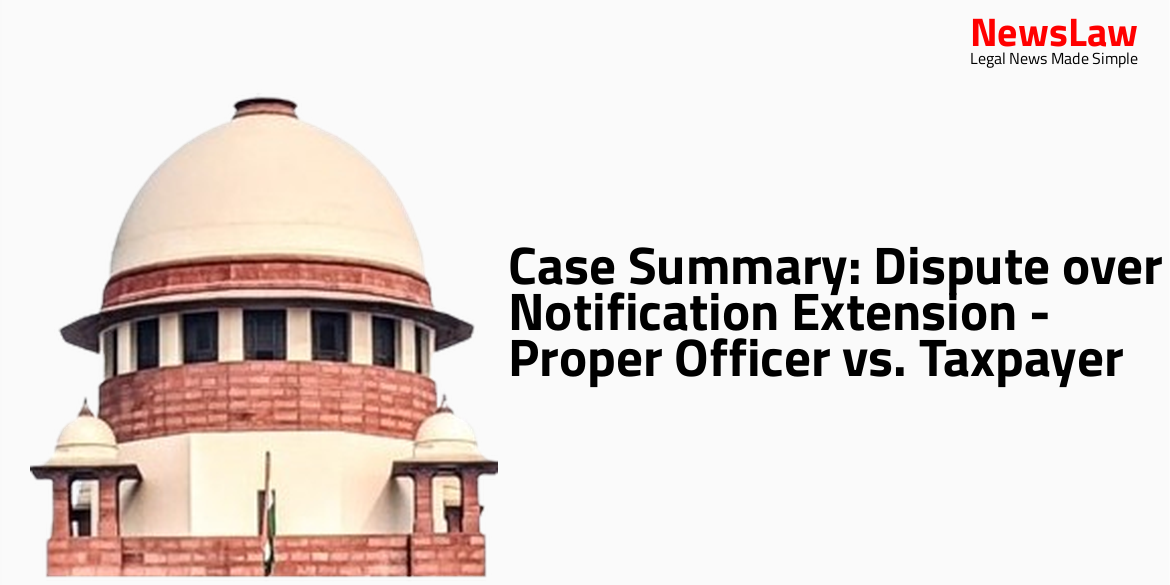In a recent landmark judgement by the Supreme Court of India, the case of land allotment transparency has been thoroughly examined. The court’s decision aims to set a precedent for equitable distribution without favoritism or nepotism. This judgement holds significance for ensuring fairness and impartiality in the allocation of state-owned properties. Stay tuned to learn more about this crucial legal ruling regarding land allotment practices.
Facts
- The school filed a Writ Petition challenging the rejection of its bid before the Allahabad High Court.
- The State Government cancelled the bid of the school due to failure to purchase the tender form within the specified time.
- The bid offered by the sons of the alleged lessee was accepted instead.
- The school sought impleadment in the suit filed by the alleged lessee.
- The alleged lessee filed an appeal against the dismissal of the suit.
- The plot in question was a Nazul property.
- The State Government later cancelled the bid of the school on the grounds of procedural error.
- An order converting the plot into freehold in favor of the alleged lessee was passed by the Special Nazul Officer.
- A deed of freehold was executed in favor of the alleged lessee by the Governor of the State.
- The school sought to challenge the orders of bid cancellation and conversion in its amendment to the Writ Petition.
- The High Court directed that the alleged lessee can only be dispossessed according to the law.
- The High Court did not interfere with the findings of the Trial Court on merits.
- A Division Bench of the High Court, after recording statements of the alleged lessee’s counsel and the authority, ordered the authority to promptly consider the lessee’s application for converting leasehold rights to freehold as per the law.
- The High Court deemed the order converting the leasehold to freehold as illegal since the market value of the plot was not required to be paid by the alleged lessee.
- The High Court declared the deed in favor of the alleged lessee as a nullity.
- The High Court left the question open regarding whether the plot could undergo a fresh auction.
Also Read: Exclusion of VAT from Taxable Turnover Upheld by Supreme Court
Arguments
- Shri Vinay Navare, representing the school, argued that the lease claimed by the alleged lessee is not valid and the conversion order in favor of the alleged lessee is illegal.
- The order dated 6 December 2000 by the Allahabad High Court in favor of the alleged lessee is claimed to be collusive and should not be considered legitimate.
- The Trial Court decided against the alleged lessee on all issues except possession, indicating the invalidity of the cancellation of the school’s bid.
- The alleged lessee was portrayed as a defaulter for not paying rent and the plot in question being a garden plot adjacent to the school’s land.
- The authority had no right to consider the alleged lessee’s conversion request during the Writ Petition, and the transfer of leasehold rights to the alleged lessee by the original lessee was questioned.
- The cancellation of the school’s bid was argued to be unjust on the grounds that the school purchased the tender document on the last date.
- Shri Jayant Bhushan, representing the alleged lessee, argued that the order of conversion was in line with the State Government’s policy and was not illegal.
- The school’s bid was not accepted due to a delay in purchasing the tender document after the specified deadline.
- The State Government’s counsel, Shri Ravindra Raizada, clarified that leasehold plots cannot be converted to freehold or auctioned as per current laws.
- The Court referred to the case of Akhil Bhartiya Upbhokta Congress v. State of Madhya Pradesh for guidance on State largesse.
- The deed based on the conversion order was defended as legal and valid by the alleged lessee’s counsel.
- Due to decades-long possession by the alleged lessee, the conversion order was deemed justifiable.
- The school’s late application to challenge the conversion and sale deed was noted, which was never approved.
Also Read: Judgment on Interim Stay of Bail Orders: The Case of Liberty vs. Judicial Discretion
Analysis
- State and its agencies cannot provide favors at their own discretion
- Largesse cannot be granted based on political whims
- Actions must be guided by fairness and impartiality
- Distribution of largesse by the State should be fair and equitable, without favouritism or nepotism.
- All actions giving benefits must be based on transparent and well-defined policies.
- Policies must be made public and implemented without discrimination.
- Treating state benefits as private ventures is considered arbitrary and discriminatory.
- The Trial Court found the alleged lessee not entitled to the benefits of specific Government Orders.
- Allotment of land by the State must be done through a transparent process, not based on individual applications.
- The State cannot exclude eligible persons from lodging competing claims for land allotment.
- The High Court upheld the Trial Court’s decision that the alleged lessee was not entitled to conversion based on Government Orders issued in 1996 and 1998.
- The order allowing conversion to freehold rights at a significantly lower price than the auction bid was deemed illegal.
- Restoring the school’s earlier bid was not considered a fair process of transferring ownership rights.
- A fair and transparent process, like public auction, is essential for the transfer of State’s ownership rights.
- The Court emphasized the need for a clear advertisement of eligibility conditions for land allotment to enable fair participation.
- The Court dismissed the appeal and directed the consideration of the alleged lessee’s application for conversion in accordance with the law.
- The matter of amendment to the Writ Petition and the challenge to conversion deed was discussed.
- The covert conversion order by the State Government was seen as an attempt to circumvent a High Court’s interim order.
- The importance of consistency with Article 14 of the Constitution in land allotment to institutions and organisations was highlighted.
- The judgment of the High Court to set aside the order of conversion and the deed of conversion in favor of the alleged lessee should not be interfered with.
- It would not be fair to allow the school to purchase the plot at the price offered 20 years ago due to the property being owned by the State.
- Even if there was an illegality in setting aside the highest bid of the school, it would be unjust to reinstate the bid accepted in the school’s favor from 20 years ago.
Also Read: Zaveri & Co. Pvt. Ltd. vs. ACIL: Legal Precedent on Guarantor Liability
Decision
- The school can apply for a refund of the bid amount paid.
- State Government/authority will issue the refund within six weeks of application.
- No order as to costs.
- Alleged lessee can apply for a refund for converting the plot from leasehold to freehold.
- Both appeals are dismissed.
- Validity of the lease claimed by the alleged lessee and the possibility of putting the plot up for auction are left open for future proceedings.
- Alleged lessee cannot be dispossessed without due process of law.
- State Government to decide on the permissibility of a fresh auction for the plot based on current policies/laws.
Case Title: CITY MONTESSORI SCHOOL Vs. STATE OF U.P. (2024 INSC 570)
Case Number: C.A. No.-008355-008355 – 2024



